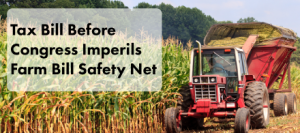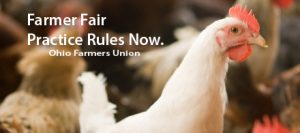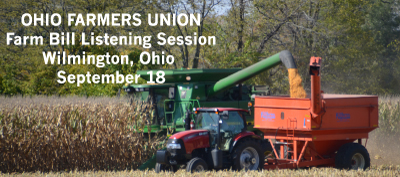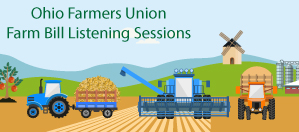Ohio Editors Note: This release is from National Farmers Union. Just last week at an annual Ohio agricultural outlook event in Columbus, ag economists noted that farm income in Ohio is down 40 percent since 2012 and predicted sub $4 corn for the immediate future. (Roughly half the price from six years ago.) ARC and PLC, mentioned below, are the primary farm safety net programs currently used by Ohio farmers to help manage the unique risks inherent in farming.
The bill before the U.S. House of Representatives passed Thursday afternoon. A separate bill is pending in the U.S. Senate.
Congressional Tax Plans Jeopardize the Farm Safety Net, CBO Analysis Says
 WASHINGTON – Amidst the steepest drop in farm profitability in a generation, U.S. Congressional leadership is proposing tax reform legislation that would jeopardize all funding for farm bill commodity safety net programs.
WASHINGTON – Amidst the steepest drop in farm profitability in a generation, U.S. Congressional leadership is proposing tax reform legislation that would jeopardize all funding for farm bill commodity safety net programs.
The two tax bills being considered in both the U.S. Senate and the U.S. House of Representatives would add $1.5 trillion to the federal deficit. According to new Congressional Budget Office analysis of the bills, that $1.5 trillion deficit increase would need to be offset by eliminating all funding for vital farm programs such as Agriculture Risk Coverage (ARC) and Price Loss Coverage (PLC), among other mandatory federal spending programs.
“If Congress passes legislation that increases the deficit, they will subsequently be forced to cut federal spending. In the case of the tax bill, current law could require 100 percent sequestration of all commodity program payments and other farm bill programs,” said National Farmers Union President Roger Johnson. “Tax cuts for the highest income brackets should absolutely not come at the expense of programs that protect our nation’s family farmers and ranchers.”
The House and Senate budget resolution that was passed earlier this year paves the way for tax cuts that would increase the U.S. federal deficit by $1.5 trillion over ten years. Statutory pay-as-you-go (PAYGO) rules require that increases in deficit spending be offset by reduced spending across non-exempt mandatory programs. The government would be required to cut such programs by $150 billion per year in accordance with PAYGO.
The total available pool of funding across all non-exempt mandatory programs amounts to, in CBO’s estimation, “only between $85 billion to $90 billion,” meaning that all impacted mandatory spending programs other than Medicare, including the Commodity Credit Corporation (CCC), would be entirely stripped of funding.
The CCC is the second largest non-exempt mandatory program, after Medicare. It funds dairy and other farm program payments, including ARC and PLC, both of which are critical for keeping family farmers and ranchers in business during times of economic uncertainty. Discretionary spending and a number of mandatory programs, including Social Security, the Supplemental Nutrition Assistance Program (SNAP), federal crop insurance, and the Conservation Reserve Program (CRP), are exempt from PAYGO.
“Farmers Union has long opposed using budget sequestration to reduce the federal deficit, especially through cuts to agricultural programs,” added Johnson. “This proposal asks farmers and ranchers to trade any possible tax benefits for the elimination of farm safety net payments, like ARC and PLC. That would be a disastrous trade. NFU continues to advocate for a simplified, progressive tax code that does not risk programs vital to the livelihoods and well-being of American family farmers and ranchers.”
 Ohio and National Farmers Union joined a coalition of 82 farm, rural and consumers groups today in sending
Ohio and National Farmers Union joined a coalition of 82 farm, rural and consumers groups today in sending  The U.S. Department of Agriculture has announced it would be terminating the Farmer Fair Practices Rule on Competitive Injury, a rule that would have provided the most basic of protections to American family farmers and ranchers as they endure increasingly concentrated markets and unfair treatment from multinational meatpackers.
The U.S. Department of Agriculture has announced it would be terminating the Farmer Fair Practices Rule on Competitive Injury, a rule that would have provided the most basic of protections to American family farmers and ranchers as they endure increasingly concentrated markets and unfair treatment from multinational meatpackers. The U.S. Environmental Protection Agency (EPA) yesterday announced this week, lower proposed obligations for renewable fuel usage under the Renewable Fuel Standard (RFS), the nation’s preeminent policy for encouraging the production and development of American grown and produced transportation fuels. The agency’s proposal would reduce obligations in 2018 for total renewable fuel volumes, biomass-based diesel, and advanced biofuel if finalized.
The U.S. Environmental Protection Agency (EPA) yesterday announced this week, lower proposed obligations for renewable fuel usage under the Renewable Fuel Standard (RFS), the nation’s preeminent policy for encouraging the production and development of American grown and produced transportation fuels. The agency’s proposal would reduce obligations in 2018 for total renewable fuel volumes, biomass-based diesel, and advanced biofuel if finalized. Your Ohio Farmers Union membership grants you membership to National Farmers Union, and NFU continues to add great member benefits!
Your Ohio Farmers Union membership grants you membership to National Farmers Union, and NFU continues to add great member benefits! OFU wants bi-partisan ACA fix that stabilizes marketplaces, protects rural hospitals
OFU wants bi-partisan ACA fix that stabilizes marketplaces, protects rural hospitals Ohio Farmers Union Event to Hear from Farmers, Provide Farm Bill Briefing
Ohio Farmers Union Event to Hear from Farmers, Provide Farm Bill Briefing As Congressional committees begin prepping for the 2018 Farm Bill, the Ohio Farmers Union and U.S. Sen. Sherrod Brown will hold a listening session and briefing in Fremont on August 29.
As Congressional committees begin prepping for the 2018 Farm Bill, the Ohio Farmers Union and U.S. Sen. Sherrod Brown will hold a listening session and briefing in Fremont on August 29.
